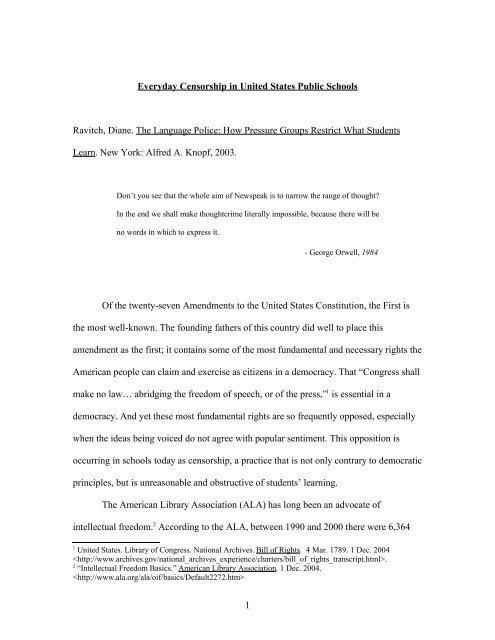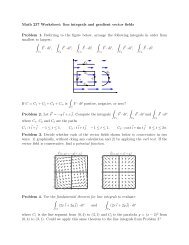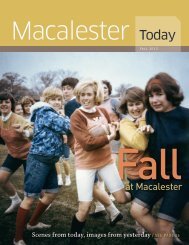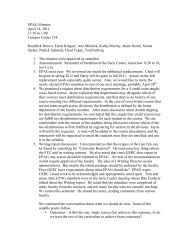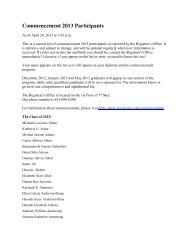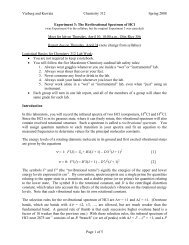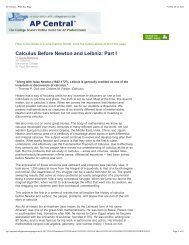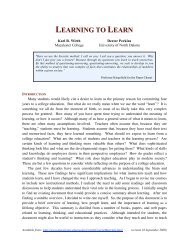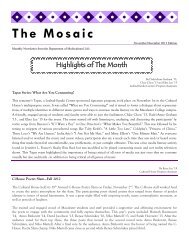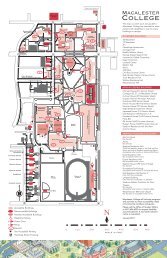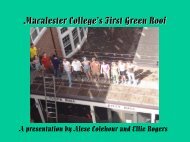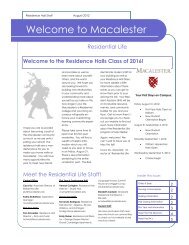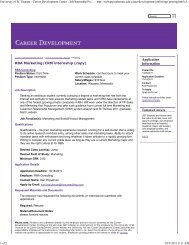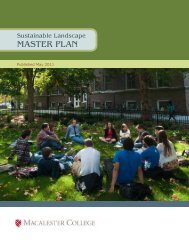Don't you see that the whole aim of Newspeak is to narrow the r
Don't you see that the whole aim of Newspeak is to narrow the r
Don't you see that the whole aim of Newspeak is to narrow the r
Create successful ePaper yourself
Turn your PDF publications into a flip-book with our unique Google optimized e-Paper software.
Everyday Censorship in United States Public Schools<br />
Ravitch, Diane. The Language Police: How Pressure Groups Restrict What Students<br />
Learn. New York: Alfred A. Knopf, 2003.<br />
Don’t <strong>you</strong> <strong>see</strong> <strong>that</strong> <strong>the</strong> <strong>whole</strong> <strong>aim</strong> <strong>of</strong> <strong>Newspeak</strong> <strong>is</strong> <strong>to</strong> <strong>narrow</strong> <strong>the</strong> range <strong>of</strong> thought?<br />
In <strong>the</strong> end we shall make thoughtcrime literally impossible, because <strong>the</strong>re will be<br />
no words in which <strong>to</strong> express it.<br />
- George Orwell, 1984<br />
Of <strong>the</strong> twenty-seven Amendments <strong>to</strong> <strong>the</strong> United States Constitution, <strong>the</strong> First <strong>is</strong><br />
<strong>the</strong> most well-known. The founding fa<strong>the</strong>rs <strong>of</strong> th<strong>is</strong> country did well <strong>to</strong> place th<strong>is</strong><br />
amendment as <strong>the</strong> first; it contains some <strong>of</strong> <strong>the</strong> most fundamental and necessary rights <strong>the</strong><br />
American people can cl<strong>aim</strong> and exerc<strong>is</strong>e as citizens in a democracy. That “Congress shall<br />
make no law… abridging <strong>the</strong> freedom <strong>of</strong> speech, or <strong>of</strong> <strong>the</strong> press,” 1 <strong>is</strong> essential in a<br />
democracy. And yet <strong>the</strong>se most fundamental rights are so frequently opposed, especially<br />
when <strong>the</strong> ideas being voiced do not agree with popular sentiment. Th<strong>is</strong> opposition <strong>is</strong><br />
occurring in schools <strong>to</strong>day as censorship, a practice <strong>that</strong> <strong>is</strong> not only contrary <strong>to</strong> democratic<br />
principles, but <strong>is</strong> unreasonable and obstructive <strong>of</strong> students’ learning.<br />
The American Library Association (ALA) has long been an advocate <strong>of</strong><br />
intellectual freedom. 2 According <strong>to</strong> <strong>the</strong> ALA, between 1990 and 2000 <strong>the</strong>re were 6,364<br />
1 United States. Library <strong>of</strong> Congress. National Archives. Bill <strong>of</strong> Rights. 4 Mar. 1789. 1 Dec. 2004<br />
.<br />
2 “Intellectual Freedom Basics.” American Library Association. 1 Dec. 2004.<br />
<br />
1
ooks which, for various reasons, individuals or groups have tried <strong>to</strong> remove from public<br />
libraries and schools. Of <strong>the</strong>se books, seventy-one percent were challenged in schools and<br />
school libraries. 3 Among <strong>the</strong> 100 most frequently challenged books between 1990 and<br />
1999 were The Adventures <strong>of</strong> Huckleberry Finn by Mark Twain, The Catcher in <strong>the</strong> Rye<br />
by J.D. Salinger, Goosebumps (series) by R.L. Stine, A Light in <strong>the</strong> Attic by Shel<br />
Silverstein, and A Brave New World by Aldous Huxley. 4<br />
But banning books <strong>is</strong>n’t <strong>the</strong> major type <strong>of</strong> censorship <strong>that</strong> <strong>is</strong> taking place in<br />
schools <strong>to</strong>day. Currently, most censorship <strong>is</strong> done before <strong>the</strong> materials even reach <strong>the</strong><br />
classroom in <strong>the</strong> form <strong>of</strong> self-censorship by major text book and test-making<br />
corporations. Pressure groups on both <strong>the</strong> right and <strong>the</strong> left are using <strong>the</strong>ir power <strong>to</strong><br />
influence textbook publ<strong>is</strong>hers, test-makers, and governments <strong>to</strong> censor <strong>the</strong> materials<br />
allowed in schools before <strong>the</strong>y even reach <strong>the</strong> classroom. Often, <strong>the</strong> intention <strong>is</strong> <strong>to</strong> avoid<br />
<strong>of</strong>fending or confusing students and <strong>the</strong>ir families by introducing <strong>to</strong>pics <strong>that</strong> <strong>the</strong>y will not<br />
be able <strong>to</strong> fully grasp at early ages, such as material <strong>that</strong> <strong>is</strong> sexually explicit or racially<br />
<strong>of</strong>fensive. But th<strong>is</strong> form <strong>of</strong> censorship <strong>is</strong> restraining children from learning <strong>to</strong> <strong>the</strong>ir full<br />
potential. Th<strong>is</strong> self-censorship, <strong>the</strong> reasons for it, and <strong>the</strong> damage it <strong>is</strong> doing <strong>to</strong> students<br />
are <strong>the</strong> focuses <strong>of</strong> Diane Ravitch’s The Language Police.<br />
Diane Ravitch has long been an important figure in <strong>the</strong> world <strong>of</strong> education policy.<br />
She serves as a h<strong>is</strong><strong>to</strong>rian <strong>of</strong> education and Research Pr<strong>of</strong>essor <strong>of</strong> Education at New York<br />
University, as well as Nonresident Senior Fellow at <strong>the</strong> Brookings Institution in<br />
Washing<strong>to</strong>n, D.C. She has also served as ass<strong>is</strong>tant secretary <strong>of</strong> research in <strong>the</strong> U.S.<br />
Department <strong>of</strong> Education for <strong>the</strong> admin<strong>is</strong>tration <strong>of</strong> President George H.W. Bush, and was<br />
3 “Challenged and Banned Books.” American Library Association. 1 Dec. 2004.<br />
<br />
4 “100 Most Frequently Challenged Books <strong>of</strong> 1990-2000.” American Library Association. 1 Dec. 2004.<br />
<br />
2
appointed by President Bill Clin<strong>to</strong>n <strong>to</strong> <strong>the</strong> National Assessment Governing Board<br />
(NAGB). It was while working as part <strong>of</strong> <strong>the</strong> NAGB <strong>that</strong> Ravitch became particularly<br />
interested in th<strong>is</strong> quietly endorsed self-censorship by textbook publ<strong>is</strong>hers, test-makers,<br />
and state and federal government. 5<br />
The Language Police explores th<strong>is</strong> <strong>is</strong>sue from both ends <strong>of</strong> <strong>the</strong> political spectrum,<br />
and shows <strong>the</strong> ways in which both <strong>the</strong> right and <strong>the</strong> left have caused children <strong>to</strong> learn (or<br />
not learn) from watered down and sometimes inaccurate texts. Public schools should not<br />
expose students <strong>to</strong> only one particular point <strong>of</strong> view, but by ruling out controversial<br />
material at ei<strong>the</strong>r end <strong>of</strong> <strong>the</strong> spectrum th<strong>is</strong> <strong>is</strong> exactly what <strong>is</strong> happening in schools <strong>to</strong>day.<br />
Students are being taught only <strong>the</strong> versions <strong>of</strong> subjects by which no one can possibly be<br />
<strong>of</strong>fended.<br />
Throughout The Language Police, Ravitch shows <strong>that</strong> through <strong>the</strong> redefinition <strong>of</strong><br />
“bias”, texts and tests are being heavily censored by <strong>the</strong>ir crea<strong>to</strong>rs because <strong>of</strong> controversy<br />
produced by individuals and interest groups who object <strong>to</strong> certain words and <strong>to</strong>pics. In<br />
order <strong>to</strong> avoid prolonged controversy (and for businesses, subsequent loss <strong>of</strong> sales),<br />
corporations and governments <strong>that</strong> provide educational materials now submit <strong>the</strong>ir texts<br />
<strong>to</strong> “bias and sensitivity review panels”. These panels are made up <strong>of</strong> ra<strong>the</strong>r small numbers<br />
<strong>of</strong> people, and <strong>the</strong>ir findings do not need <strong>to</strong> be made public; <strong>the</strong>y are property <strong>of</strong> <strong>the</strong><br />
company <strong>that</strong> conducts <strong>the</strong> review. Ravitch had access <strong>to</strong> many <strong>of</strong> <strong>the</strong> bias and sensitivity<br />
reviews only because she was part <strong>of</strong> <strong>the</strong> NAGB, which was <strong>to</strong> be responsible for <strong>the</strong><br />
creation <strong>of</strong> a national standardized test (7). Ravitch asserts <strong>that</strong> by <strong>the</strong> time material has<br />
been thoroughly cleansed <strong>of</strong> anything and everything <strong>that</strong> <strong>is</strong> potentially <strong>of</strong>fensive <strong>to</strong><br />
anyone anywhere, text <strong>is</strong> at best exceptionally bland. At worst, <strong>the</strong> resulting texts do not<br />
5 “Diane Ravitch Curriculum Vita.” 1 Dec. 2004. < http://www.dianeravitch.com/vita.html><br />
3
epresent reality and stray from fact. Ravitch shows quite powerfully why it <strong>is</strong> imperative<br />
<strong>that</strong> we s<strong>to</strong>p <strong>the</strong> Language Police from censoring <strong>the</strong> information <strong>that</strong> <strong>is</strong> available and<br />
taught <strong>to</strong> students in public schools.<br />
While powerful and opinionated, The Language Police <strong>is</strong> written in a very<br />
sensible, rational, forthright manner. Ravitch draws upon her experience as an<br />
educational h<strong>is</strong><strong>to</strong>rian and her role in policy-making <strong>to</strong> demonstrate some <strong>of</strong> <strong>the</strong> absurd<br />
reasons for which works are censored. The first chapter, Forbidden Topics, Forbidden<br />
Words, <strong>is</strong> nearly exclusively dedicated <strong>to</strong> brief examples <strong>of</strong> some ra<strong>the</strong>r bizarre cases <strong>of</strong><br />
censorship. In one outstanding case, a bias and sensitivity review panel voted 12-11 <strong>to</strong><br />
remove a passage entitled “The Blind Mountain Climber,” from <strong>the</strong> pool <strong>of</strong> possibilities<br />
on a reading comprehension test. What could be so <strong>of</strong>fensive about <strong>the</strong> heroic true s<strong>to</strong>ry<br />
<strong>of</strong> a <strong>you</strong>ng blind mountain climber? The reasoning behind <strong>the</strong> panel’s dec<strong>is</strong>ion was <strong>that</strong><br />
<strong>the</strong> passage demonstrated “regional bias” and was demeaning <strong>to</strong> blind persons. By<br />
“regional bias,” <strong>the</strong> panel makes <strong>the</strong> assumption <strong>that</strong> children not living in a region <strong>that</strong><br />
contains mountains would have no way <strong>of</strong> relating <strong>to</strong> <strong>the</strong> s<strong>to</strong>ry. The panel also found <strong>that</strong><br />
<strong>the</strong> passage was demeaning <strong>to</strong> blind persons by suggesting <strong>that</strong> <strong>the</strong>y were at a<br />
d<strong>is</strong>advantage as compared <strong>to</strong> people with sight. Most people would probably not object <strong>to</strong><br />
th<strong>is</strong> s<strong>to</strong>ry. Few people would argue <strong>that</strong> it <strong>is</strong> not a d<strong>is</strong>advantage <strong>to</strong> be unable <strong>to</strong> <strong>see</strong> on a<br />
rocky, icy, dangerous mountain. But <strong>the</strong>se types <strong>of</strong> dec<strong>is</strong>ions are made time and time<br />
again by bias and sensitivity panels. Ravitch makes her point loudly and clearly in her<br />
first chapter. Th<strong>is</strong> censorship <strong>is</strong> not only contrary <strong>to</strong> our fundamental democratic<br />
principles, but <strong>is</strong> pure fool<strong>is</strong>hness.<br />
One <strong>of</strong> <strong>the</strong> reasons for <strong>the</strong> <strong>see</strong>mingly bizarre dec<strong>is</strong>ions made by <strong>the</strong> bias and<br />
sensitivity panels <strong>is</strong> <strong>the</strong> new definition <strong>of</strong> “bias,” which was <strong>the</strong> focus <strong>of</strong> <strong>the</strong> second<br />
4
chapter. In a document entitled “Bias and Sensitivity Concerns in Testing” provided <strong>to</strong><br />
Diane Ravitch by Riverside Publ<strong>is</strong>hing as part <strong>of</strong> her work for NAGB, “bias” <strong>is</strong> defined<br />
as anything in a test item <strong>that</strong> might cause any student <strong>to</strong> be d<strong>is</strong>tracted or upset, which<br />
could prevent a student <strong>to</strong> demonstrating <strong>the</strong>ir full ability. Such broad definitions <strong>of</strong> bias<br />
also give broad power <strong>to</strong> <strong>the</strong> panels <strong>that</strong> review tests and texts for bias. Initially, bias and<br />
sensitivity reviewers were meant <strong>to</strong> remove blatantly rac<strong>is</strong>t and sex<strong>is</strong>t language from<br />
texts, but <strong>the</strong>ir roles have been expanded <strong>to</strong> cleanse text <strong>of</strong> anything possibly<br />
objectionable, and <strong>see</strong>mingly without logical consideration. As Ravitch puts it, “How did<br />
<strong>the</strong> sensible principle <strong>of</strong> removing rac<strong>is</strong>t and sex<strong>is</strong>t language turn in<strong>to</strong> th<strong>is</strong> effort <strong>to</strong> delete<br />
whatever might annoy or <strong>of</strong>fend <strong>the</strong> most agitated imaginations (18)?”<br />
The two following chapters d<strong>is</strong>cuss <strong>the</strong> process by which test-makers and<br />
publ<strong>is</strong>hing companies use bias and sensitivity reviews <strong>to</strong> censor out any controversial<br />
material. With some difficulty, Ravitch was able <strong>to</strong> collect information regarding <strong>the</strong> bias<br />
and sensitivity guidelines <strong>of</strong> most publ<strong>is</strong>hing companies. From <strong>the</strong> research she<br />
conducted, Ravitch could not identify a single publ<strong>is</strong>hing company <strong>that</strong> did not subject its<br />
material <strong>to</strong> a bias and sensitivity review. Because <strong>of</strong> <strong>the</strong> interconnections in <strong>the</strong><br />
publ<strong>is</strong>hing world, she was not surpr<strong>is</strong>ed <strong>to</strong> find <strong>that</strong> <strong>the</strong> documents did not vary<br />
significantly from publ<strong>is</strong>her <strong>to</strong> publ<strong>is</strong>her. One ra<strong>the</strong>r as<strong>to</strong>unding fact, however, was <strong>that</strong><br />
most <strong>of</strong> <strong>the</strong> blatantly sex<strong>is</strong>t and rac<strong>is</strong>t phrases were deemed so obvious <strong>that</strong> <strong>the</strong>y were not<br />
even l<strong>is</strong>ted in <strong>the</strong> company guidelines (32). Ravitch goes on <strong>to</strong> describe <strong>the</strong> ways interest<br />
groups have pressured textbook publ<strong>is</strong>hers <strong>to</strong> write against <strong>the</strong> stereotype, sometimes <strong>to</strong><br />
<strong>the</strong> point <strong>of</strong> ignoring reality completely. For example, edi<strong>to</strong>rs selecting multicultural<br />
literature in 2001 for Hough<strong>to</strong>n-Mifflin were cautioned not <strong>to</strong> choose passages <strong>that</strong><br />
depicted Latinos as migrant workers, African Americans as athletes or musicians, or<br />
5
Asian Americans as a “model minority (47).” Although Latino migrant workers, African<br />
American athletes, and Asian American valedic<strong>to</strong>rians all ex<strong>is</strong>t, it <strong>is</strong> not acceptable <strong>to</strong><br />
document <strong>the</strong>ir challenges and successes because it would be feeding a stereotype.<br />
Interest groups also pressure publ<strong>is</strong>hers <strong>to</strong> depict stat<strong>is</strong>tically accurate ratios <strong>of</strong> minorities,<br />
females, d<strong>is</strong>abled persons, and ages. While journal<strong>is</strong>ts and edi<strong>to</strong>rs in o<strong>the</strong>r areas are<br />
allowed <strong>to</strong> use d<strong>is</strong>cretion <strong>to</strong> determine what s<strong>to</strong>ries <strong>to</strong> cover and what language and<br />
illustrations <strong>to</strong> use, in <strong>the</strong> textbook business <strong>the</strong> <strong>to</strong>pics, words, and illustrations are pre-<br />
formulated. Ultimately, Ravitch’s point <strong>is</strong> <strong>that</strong> in a country <strong>that</strong> <strong>is</strong> built upon <strong>the</strong> right <strong>to</strong><br />
freedom <strong>of</strong> speech, people should be outraged by th<strong>is</strong> widely accepted, long standing<br />
practice <strong>of</strong> censorship in <strong>the</strong> educational publ<strong>is</strong>hing industry. Yet th<strong>is</strong> process has<br />
flour<strong>is</strong>hed almost undetected for years.<br />
Censorship in educational publ<strong>is</strong>hing <strong>is</strong> coming from two very different and <strong>of</strong>ten<br />
conflicting angles. According <strong>to</strong> Ravitch, censorship from <strong>the</strong> right end <strong>of</strong> <strong>the</strong> political<br />
spectrum comes in <strong>the</strong> form <strong>of</strong> idealized v<strong>is</strong>ions <strong>of</strong> <strong>the</strong> past and a desire <strong>to</strong> control <strong>the</strong><br />
<strong>to</strong>pics presented in classrooms, while censorship from <strong>the</strong> left <strong>is</strong> characterized by<br />
ideal<strong>is</strong>tic v<strong>is</strong>ions <strong>of</strong> <strong>the</strong> future and attempts <strong>to</strong> limit specific words and phrases included<br />
in texts. The right <strong>is</strong> <strong>of</strong>ten concerned with broad <strong>to</strong>pics which represent views<br />
contradic<strong>to</strong>ry <strong>to</strong> those <strong>to</strong> which <strong>the</strong>y adhere. Such <strong>to</strong>pics include secular human<strong>is</strong>m,<br />
satan<strong>is</strong>m, witchcraft, fantasy, magic <strong>the</strong> occult, d<strong>is</strong>obedience, d<strong>is</strong>honesty, femin<strong>is</strong>m,<br />
evolution, telepathy, one-world government, <strong>to</strong> name a few. Examples <strong>of</strong> large<br />
movements for censorship from <strong>the</strong> right include efforts during <strong>the</strong> 1950s <strong>to</strong> block from<br />
classrooms and schools any point <strong>of</strong> view <strong>that</strong> could be considered “un-American”, or <strong>the</strong><br />
more recent and ongoing effort <strong>to</strong> limit <strong>the</strong> teaching <strong>of</strong> evolution. Ravitch points out <strong>that</strong><br />
<strong>the</strong>se groups are <strong>of</strong>ten concentrated on censoring individual books, such as Ar<strong>is</strong><strong>to</strong>phanes’<br />
6
Lys<strong>is</strong>trata, Charles Dickens’s Great Expectations, or more recently, <strong>the</strong> Harry Potter<br />
series by J.K. Rowling. The left, on <strong>the</strong> o<strong>the</strong>r hand, <strong>is</strong> interested in censoring particular<br />
words and phrases <strong>that</strong> are deemed <strong>of</strong>fensive, and have great success doing so in <strong>the</strong><br />
textbook industry. Th<strong>is</strong> movement might <strong>see</strong>m <strong>to</strong> be a much more optim<strong>is</strong>tic than <strong>the</strong><br />
movement from <strong>the</strong> right, and <strong>the</strong> stated goal <strong>is</strong> “fairness.” However, Ravitch asserts <strong>that</strong><br />
“fairness” <strong>is</strong> an Orwellian concept in its new application. One <strong>of</strong> <strong>the</strong> most infamous<br />
examples <strong>of</strong> th<strong>is</strong> <strong>is</strong> <strong>the</strong> ongoing effort <strong>to</strong> censor Mark Twain’s The Adventures <strong>of</strong><br />
Huckleberry Finn, because <strong>of</strong> its use <strong>of</strong> <strong>the</strong> word nigger. When both groups are able <strong>to</strong><br />
effectively edit out <strong>of</strong> textbooks anything deemed unsat<strong>is</strong>fac<strong>to</strong>ry, what remains <strong>is</strong> fairly<br />
insubstantial.<br />
Part <strong>of</strong> <strong>the</strong> reason interest groups from ei<strong>the</strong>r <strong>the</strong> right or <strong>the</strong> left are able <strong>to</strong><br />
pressure publ<strong>is</strong>hing companies so successfully <strong>is</strong> <strong>the</strong> manner in which states select<br />
textbooks. In many states a small board reviews textbooks and creates a l<strong>is</strong>t <strong>of</strong> those it<br />
deems suitable. If an individual d<strong>is</strong>trict within <strong>the</strong> state w<strong>is</strong>hes <strong>to</strong> use a different textbook,<br />
<strong>the</strong> state will not pay for <strong>the</strong> cost <strong>of</strong> <strong>the</strong> books, and <strong>the</strong>re are few d<strong>is</strong>tricts <strong>that</strong> can afford<br />
<strong>to</strong> purchase books <strong>that</strong> do not appear on <strong>the</strong> state l<strong>is</strong>t. Because textbooks are publ<strong>is</strong>hed <strong>to</strong><br />
make a pr<strong>of</strong>it, it <strong>is</strong> financially important <strong>to</strong> publ<strong>is</strong>hers <strong>to</strong> have <strong>the</strong>ir textbooks accepted in<br />
states <strong>that</strong> use th<strong>is</strong> centralized method for selection, especially in large states such as<br />
California and Texas. Because it <strong>is</strong> so financially important for publ<strong>is</strong>hers <strong>to</strong> sell <strong>the</strong>ir<br />
books in <strong>the</strong> few large states with a centralized textbook adoption process, textbooks are<br />
<strong>of</strong>ten tailored <strong>to</strong> fit <strong>the</strong> specifications <strong>of</strong> only a few small committees. Th<strong>is</strong> drives<br />
competition down substantially, <strong>narrow</strong>ing <strong>the</strong> market and making it more difficult for<br />
small publ<strong>is</strong>hing companies <strong>to</strong> compete, no matter <strong>the</strong> quality <strong>of</strong> <strong>the</strong>ir product. The<br />
7
centralized process <strong>of</strong> textbook adoption also makes it much easier for small interest<br />
groups <strong>to</strong> effectively pressure <strong>the</strong> adoption process.<br />
In <strong>the</strong> eighth chapter, Literature: Forgetting <strong>the</strong> Tradition, Ravitch laments <strong>the</strong><br />
lack <strong>of</strong> great American literature being read in public schools <strong>to</strong>day. Whe<strong>the</strong>r because it<br />
has been m<strong>aim</strong>ed in <strong>the</strong> process <strong>of</strong> removing so-called <strong>of</strong>fensive language, because it <strong>is</strong><br />
simply not required, or because it has been completely banned from classrooms and<br />
school libraries, most children are not exposed <strong>to</strong> strong American literature. There <strong>is</strong> not<br />
a single state in <strong>the</strong> U.S. <strong>that</strong> requires its students <strong>to</strong> read any particular book or author.<br />
Few even recommend <strong>that</strong> students read any particular important pieces literature. And<br />
many <strong>of</strong> <strong>the</strong> books and authors considered <strong>to</strong> be <strong>the</strong> most important are also among <strong>the</strong><br />
most controversial. Mark Twain, George Orwell, John Steinbeck, and Maya Angelou are<br />
just a few <strong>of</strong> <strong>the</strong> prominent authors whose books are frequently challenged. Ravitch has<br />
similar concerns with h<strong>is</strong><strong>to</strong>ry. Censorship in h<strong>is</strong><strong>to</strong>ry textbooks can <strong>see</strong>mingly change<br />
h<strong>is</strong><strong>to</strong>ry. Censorship from <strong>the</strong> right and <strong>the</strong> left has been known <strong>to</strong> try <strong>to</strong> rev<strong>is</strong>e <strong>the</strong> way<br />
h<strong>is</strong><strong>to</strong>ry <strong>is</strong> written in order <strong>to</strong> change <strong>the</strong> perception <strong>of</strong> it <strong>to</strong> better fit a certain set <strong>of</strong> views.<br />
Ravitch <strong>is</strong> firm in her assertion <strong>that</strong> censorship, no matter what <strong>the</strong> intention,<br />
ought <strong>to</strong> be abhorrent <strong>to</strong> <strong>the</strong> American people. In our drive <strong>to</strong> ensure <strong>that</strong> no one <strong>is</strong><br />
<strong>of</strong>fended, we forget <strong>the</strong> latent meaning in <strong>the</strong> right <strong>to</strong> free speech; everyone has <strong>the</strong> right<br />
<strong>to</strong> speak freely. Even when ideas are <strong>of</strong>fensive or bo<strong>the</strong>rsome <strong>to</strong> someone, <strong>the</strong> right <strong>to</strong><br />
express <strong>the</strong>m remains. As Ravitch so eloquently puts it, “Th<strong>is</strong> <strong>is</strong> <strong>the</strong> burden <strong>of</strong><br />
maintaining a free society…No one has a right not <strong>to</strong> be criticized or <strong>of</strong>fended (161).”<br />
There <strong>is</strong> hope. Diane Ravitch concludes with some very concrete and <strong>see</strong>mingly<br />
feasible ways in which <strong>to</strong> s<strong>to</strong>p <strong>the</strong> Language Police. The first suggestion <strong>is</strong> competition.<br />
We should put an end <strong>to</strong> state textbook adoptions so <strong>that</strong> <strong>the</strong> market for <strong>the</strong>m <strong>is</strong> more<br />
8
diversified and <strong>the</strong> power <strong>to</strong> purchase <strong>the</strong>m <strong>is</strong> in <strong>the</strong> hands <strong>of</strong> more people and closer <strong>to</strong><br />
<strong>the</strong> classroom. The second <strong>is</strong> sunshine, or <strong>to</strong> shed light upon <strong>the</strong> bias and sensitivity<br />
reviewing process. Corporations and governments should be required <strong>to</strong> make public <strong>the</strong><br />
dec<strong>is</strong>ions <strong>to</strong> edit (censor) information out <strong>of</strong> textbooks. Ravitch also believes <strong>that</strong><br />
textbooks should be reviewed in a process similar <strong>to</strong> <strong>that</strong> <strong>of</strong> o<strong>the</strong>r books by critics and<br />
scholars, and <strong>the</strong>se reviews should be made readily available. The third policy set forth <strong>to</strong><br />
s<strong>to</strong>p censorship in schools <strong>is</strong> better-educated teachers. When teachers are better-trained<br />
(and teaching in <strong>the</strong>ir subject <strong>of</strong> expert<strong>is</strong>e) <strong>the</strong>y are able <strong>to</strong> recognize material <strong>that</strong> <strong>is</strong><br />
heavily politicized and <strong>is</strong> not factual. They are also able <strong>to</strong> exerc<strong>is</strong>e d<strong>is</strong>cretion about <strong>the</strong><br />
appropriateness <strong>of</strong> <strong>the</strong> material presented in class.<br />
Throughout The Language Police, Diane Ravitch makes quite clear just how<br />
widespread th<strong>is</strong> harmful (and largely absurd) practice has become. Ravitch <strong>is</strong> not without<br />
her own biases, and while her opinions are made quite clear, she covers th<strong>is</strong> <strong>is</strong>sue from<br />
many political and social viewpoints. Her critic<strong>is</strong>m does not fall upon any particular<br />
group or set <strong>of</strong> views; ra<strong>the</strong>r, she criticizes all who would inhibit students from gaining<br />
access <strong>to</strong> a wide variety <strong>of</strong> accurate information. The Language Police <strong>is</strong> valuable <strong>to</strong> any<br />
person interested in <strong>the</strong> role censorship plays in public schools <strong>to</strong>day. Written by a<br />
leading educational h<strong>is</strong><strong>to</strong>rian with years <strong>of</strong> experience in policy-making, The Language<br />
Police demonstrates <strong>the</strong> extent <strong>to</strong> which censorship occurs in public schools, how th<strong>is</strong> has<br />
developed, and <strong>the</strong> harm it <strong>is</strong> doing <strong>to</strong> <strong>the</strong> nation’s students. Ravitch’s opinions, stated<br />
very clearly throughout th<strong>is</strong> book, will not necessarily be congruent <strong>to</strong> those <strong>of</strong> its<br />
audience. However, regardless <strong>of</strong> differing points <strong>of</strong> view, th<strong>is</strong> book presents and<br />
d<strong>is</strong>cusses in careful detail a very important subject affecting education in America <strong>to</strong>day.<br />
Justice Lou<strong>is</strong> D. Braide<strong>is</strong> once said, “The greatest dangers <strong>to</strong> liberty lurk in insidious<br />
9
encroachment by men <strong>of</strong> zeal, well-meaning but without understanding (3).” The<br />
Language Police carefully contributes <strong>to</strong> <strong>the</strong> understanding <strong>of</strong> <strong>the</strong> <strong>is</strong>sue <strong>of</strong> censorship in<br />
public schools by shedding light on<strong>to</strong> little-known practices. But it <strong>is</strong> up <strong>to</strong> us <strong>to</strong> <strong>see</strong> <strong>the</strong>se<br />
practices and act <strong>to</strong> change <strong>the</strong>m.<br />
December 16, 2004. M<strong>is</strong>ha Coleman can be reached at mcoleman@macalester.edu<br />
10


